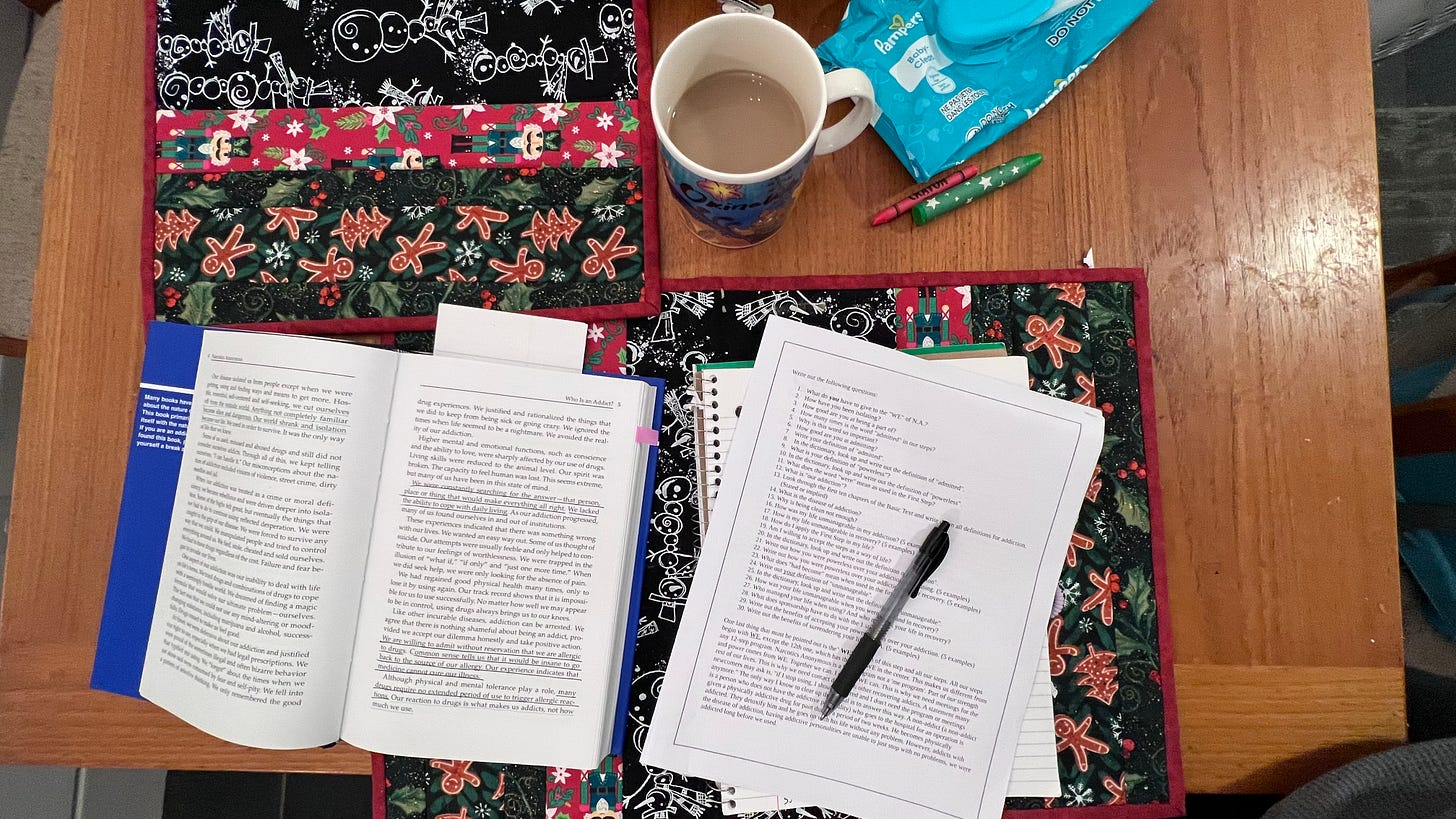This personal reflection focuses on my four years of recovery. It does not specifically mention using of substances but does focus on the journey to healing. It is tender for me to share but I know that it may help at least one person have empathy for what an addict is and that helps me write.
…
January 20, 2019
I sat across from my husband at a half-empty Mexican restaurant with a menu that looked unappealing. I ordered a daiquiri, which was my attempt to numb the feelings swirling within me. Anger, resentment, sadness, and confusion boiled over inside my body like a pot of starchy noodles that cannot be contained.
We would head to my parents’ home next to reveal my husbands addiction. I was adamant about making a game plan. That included a Narcotics Anonymous meeting. We would make him better.
The Sunday night meeting was packed with people who felt loud. For a winter night it felt hot and we grabbed seats in the back, hoping to be unnoticed. Immediately a man approached us, said his name, and gave us hugs. It felt like an unwanted spotlight; the recognition that someone was here with less than 30 days clean. We didn’t even know what that meant.
…
January 23, 2019
I sat across from my husband at another NA meeting. I had spent the past two days crying to anyone there about how hard it was for me.
A woman shared how she found herself avoiding the wine aisle only to see if nonalcoholic wine was on sale there “just to have one more taste.”
Clarity in the car hits me as I confusingly cry “We shouldn’t be here for me. I’m not the addict, right?”
…
In the past four years I have seen people come and go. I’ve met men and women of all ages and backgrounds gather in church basements to share their gratitude, hopes, fears, and burning desires.
Sometimes I get more fellowship from these meetings than I do from church functions; an irony considering their common locations. Where Christians greet one another with coffee in the Sunday morning light and sing of letting go of their shame, I see more sin being placed at Christ’s feet in the church basements.
Step one is to surrender. What does that mean? I asked. What do I do?
Ironic again that I had been calling myself a Christian for five years already between drinking binges and wild weekends with friends. What I didn’t know, what the first step of NA taught me before my church community did was that all Christians are just as sinful as the person next to them. Surrender is a daily prayer, a continuous acknowledgment that we’ll never be enough and we can trust God or Higher Power to be enough: all powerful, loving, and strong for us.
I knew as a Christian that textbook answer “God sent his son for us to take away the sins of the world…Jesus is our salvation.”
But the freedom I began to witness was less in the appearance of people at service reciting words but more in the people with clunky words as they read from blue books.
I saw members of my church truly loving Jesus and the freedom he had brought them but it felt like a 1:10 ratio of impacted disciples compared to a 8:10 ratio of addicts who chased the hope in surrendering to a power greater than themselves.
Most of us addicts have taken a leap toward God that people without addiction cannot openly express.
When my pastor asked anyone if they’d like to share their deepest struggles and sins in front of the whole congregation we all nervously laughed at the idea. No one spoke up.
Yet I attend a meeting where men and women gather after college or work or outpatient therapy and one by one raise their voices to surrender their sins in front of everyone there. With styrofoam coffee cups instead of wine, they pour out their lives and serve the still suffering addict, whether it’s the newcomer, the returning addict after a relapse, or the mother who is overwhelmed and knows she’s got a safe space to breathe.
“Hello, my name is ___ and I am an addict” becomes the confession we willingly share with those present. We share because we know we are gathered to love one another wherever we are at and for that hour that is where no using or drinking is happening.
It has taken me four years in this fellowship to truly feel like people want me there and care for me. That is not because it wasn’t safe to begin with, but because my heart has needed four years to believe it.
One man says he feels relief to see my face back in meetings because he doesn’t know if I’m ok otherwise. One woman shared she sees my love for Christ in the rooms. More people shared. I let hot tears fall on my sleeping daughter’s head as they humbled me with their words.
When you walk into the rooms of NA with your preconceived notions about who an addict is or what they want from you, hearing “we will love you until you love yourself” feels like a lie. When we cannot truly love ourselves it feels impossible.
NA has been the mirror I can see my character defects through without seeing self hatred. It is not the fun house mirror of addiction, where you see yourself with ego or depression. It is the mirror that reflects love back to you. It is built with the light of those in the rooms praying for you.




